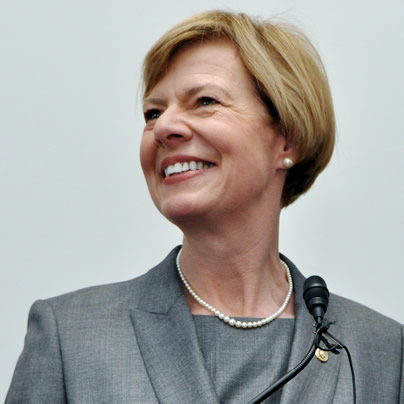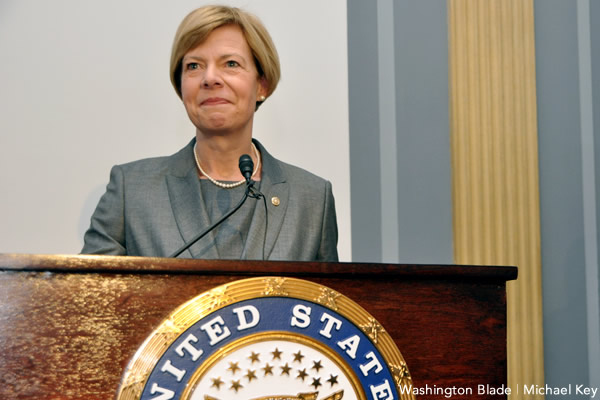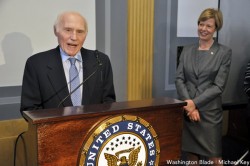National
Baldwin sworn in as first openly gay U.S. senator
Paul Ryan makes appearance at lesbian senator’s reception


Senator Tammy Baldwin (D-Wis.) speaks at a reception following her swearing-in ceremony. (Washington Blade photo by Michael Key)
In a historic day at the start of the 113th Congress, Sen. Tammy Baldwin (D-Wis.) was sworn into office on Thursday as the junior U.S. senator from Wisconsin, officially becoming the first openly gay senator.
At a reception that followed in the Russell Senate Office Building, Baldwin thanked more than 100 supporters and Democratic donors in attendance and called on them to continue the fight to enact change for the country.
“I am proud to have the honor to have been sworn in an hour or so ago as the first woman senator for the state of Wisconsin and as the first openly gay member to serve in the United States Senate in our nation’s history,” Baldwin said, eliciting applause from the audience.
Baldwin attended the reception after being sworn in on the Senate floor by Vice President Joseph Biden along with other freshman senators and colleagues who were re-elected. The room erupted in cheers and applause as she entered after being sworn in as a U.S. senator.
Also attending the reception was Baldwin’s mother, Pam Bin-Rella. As Baldwin began to speak, Bin-Rella was standing with a cane near the podium before Baldwin. The new senator said she had to address a “little logistical matter” before she continued, then positioned a wheelchair nearby for her mother to take a seat.
“I’m going to thank you the best way that any public official knows how to thank you: I’m going to ask you to do more,” she continued. “As I ran to make a difference, I intend to make a difference. Just like nobody wins a Senate seat alone, nobody moves a state or a country forward alone.”
Baldwin was sworn in on Thursday on the same day as the entire membership of the U.S. House for the 113th Congress. That includes openly gay Reps. Jared Polis (D-Colo.), David Cicilline (D-R.I.), Sean Patrick Maloney (D-N.Y.), Kyrsten Sinema (D-Ariz.), Mark Takano (D-Calif.) and Mark Pocan (D-Wis.).
Introducing Baldwin at the reception was outgoing Sen. Herb Kohl (D-Wis.), whom Baldwin will replace in the U.S. Senate after his 24 years in Congress. Kohl said Baldwin has “all the qualities I, and I know, so many others look for in somebody to represent us all across the state of Wisconsin.”
“After I got elected, as a senator from Wisconsin, I got a phone call from my predecessor, Sen. [William] Proxmire,” Kohl said. “And he was effusive in his praise of me, and he predicted that I will be a model senator. He said that several times, and he was very careful in his use of words, so I couldn’t forget that he used the word ‘model,’ and I wondered why he used that word specifically. So, I went to the dictionary and looked up that word: ‘model — a model is a small replica of the real thing.’ So, I’m not going to tell Tammy that she’s going to be a ‘model’ senator.”
At the event, Human Rights Campaign President Chad Griffin told the Washington Blade that Baldwin’s swearing in as a U.S. senator marked “a real historic day.”
“Having Tammy Baldwin serve in the United States Senate is historic,” Griffin said. “To have one of us inside the chamber is meaningful for a number of reasons because we have a champion now that’s one of us in the Senate. But it also makes it more difficult for those who are against us to look at our colleague in the eye and to talk negatively about LGBT people, so I’m so excited to be able to work with Tammy as she begins today as a United States senator.”
Other LGBT notables at the event were Rea Carey, executive director of the National Gay & Lesbian Task Force; Brian Bond, director of constituency outreach for the Democratic National Committee; and Peter Rosenstein, a D.C.-based Democratic activist. Sens. Chuck Schumer (D-N.Y.), Barbara Mikulski (D-Md.), Kirsten Gillbrand (D-N.Y.), Patty Murray (D-Wash.) and Max Baucus (D-Mont.) also made appearances.
Baldwin’s staff said the senator wasn’t taking questions at the reception. She’s yet to participate in an interview with the Washington Blade since her election, despite numerous requests to her transition team.

Human Rights Campaign President Chad Griffin speaking with Rep. Paul Ryan (R-Wis.) (Washington Blade photo by Chris Johnson)
Paul Ryan mingles with Baldwin supporters at reception
Another notable guest at the reception was fellow Wisconsinite and House Budget Committee Chair Paul Ryan, who was the Republican vice presidential nominee last year. He attended the reception early on and left before Baldwin made her appearance.
Ryan’s appearance at a reception largely attended by Baldwin supporters — many of whom are LGBT — is noteworthy because of his anti-gay voting record. Ryan was a keynote speaker during the annual Value Voters Summit last year, which was hosted by the anti-gay Family Research Council.
At the reception, Ryan declined to take questions from the Blade, saying he wasn’t speaking to the media at the occasion.
Griffin was seen talking briefly with Ryan at the reception. Later, Griffin told the Blade he wanted to speak with him because LGBT advocates can’t only engage with their allies.
“Look, it’s just as important that we talk to our friends as it is that we talk to those who are often against us,” Griffin said. “And so, I introduced myself and thanked him for being here at Tammy’s event and told them I hope we can find some things together to work together on.”
Asked for specifics on what they could find in common, Griffin replied, “It was a private conversation. So, I’ll leave it at that. But it was general conversation about my desire to find some common ground on things.”
Ryan, who’s still considered a rising star within the GOP, posed for photos with attendees. Among them was Jo Deutsch, the federal director for the New York-based LGBT group Freedom to Marry. At a point while taking photos, Ryan declared, “We’re all personal friends,” although it’s unclear to whom he was referring.
Kevin Seifert, a Ryan spokesperson, said in response to a request for comment that the congressman was “pleased to attend” the Baldwin reception.
“Congressman Ryan has served with Senator Baldwin for years and he wanted to take the opportunity to congratulate her as the next senator from the great state of Wisconsin,” Seifert added. “As to the conversation with Human Rights Campaign President Chad Griffin, it was a private conversation and I do not have any further information about the nature of their discussion.”
The former vice presidential candidate voted against hate crimes protection and “Don’t Ask, Don’t Tell” and voted on two separate occasions for the Federal Marriage Amendment. Still, he was among a handful of Republicans who voted for a version of the Employment Non-Discrimination Act in 2007, although he previously voted in favor of a motion to recommit to scuttle the bill on the House floor.
CORRECTION: An initial version of this article mistakenly identified Jo Deutsch as a Republican. The Blade regrets the error.

Texas state Rep. James Talarico won a hard-fought primary Tuesday to become the state’s Democratic nominee for U.S. Senate, defeating U.S. Rep. Jasmine Crockett in one of the year’s most closely watched and competitive Democratic contests.
Talarico, a Presbyterian seminarian and three-term lawmaker from Round Rock, was declared the winner by the Associated Press early Wednesday morning after a closely tracked vote count that drew national attention.
“Tonight, the people of our state gave this country a little bit of hope,” Talarico told the AP. “And a little bit of hope is a dangerous thing.”
With 52.8% of the vote to Crockett’s 45.9%, Talarico secured the nomination outright, avoiding a runoff and capping months of sharp contrasts between the two candidates over strategy, messaging, and how best to compete statewide in Texas. Democrats hope the competitive primary — and the relatively narrow margin — signals growing momentum in a state that has not elected a Democrat to the U.S. Senate since 1988.
Talarico has long expressed support for the LGBTQ community, a position he highlights prominently on his campaign website. Under the “Issues” section, he directly addresses assumptions that might arise from his faith and background as a seminarian in a deeply conservative state.
“My faith in Jesus leads me to reject Christian Nationalism and commit myself to the project of democracy,” his website reads. “Because that’s the promise of America: a democracy where every person and every family — regardless of religion, race, gender, sexual orientation, or any other difference between us — can truly be free and live up to their full potential.”
Crockett struck a conciliatory tone following her defeat, emphasizing party unity ahead of November.
“This morning I called James and congratulated him on becoming the Senate nominee,” Crockett told Politico. “Texas is primed to turn blue and we must remain united because this is bigger than any one person. This is about the future of all 30 million Texans and getting America back on track.”
Talarico also drew national attention earlier in the race when “Late Show” host Stephen Colbert said he was initially unable to air an interview with the state legislator due to potential FCC concerns involving CBS. The episode sparked a broader political debate.
Brendan Carr, chair of the Federal Communications Commission, appointed by President Donald Trump, told reporters the controversy was a “hoax,” though he also acknowledged Talarico’s ability to harness the moment to build support as an underdog candidate. The interview was later released online and garnered millions of views, boosting Talarico’s national profile.
In November, Talarico will face the winner of the Republican primary between incumbent Sen. John Cornyn and Texas Attorney General Ken Paxton, who have been locked in a bruising GOP contest. Rep. Wesley Hunt was also in the Republican primary field. The GOP race is expected to head to a May runoff.
In a joint statement, Senate Minority Leader Chuck Schumer and Democratic Senatorial Campaign Committee Chair Kirsten Gillibrand praised Talarico’s victory and framed him as a candidate capable of broad appeal.
“As an eighth-generation Texan, former middle school teacher, and Presbyterian seminarian, James will be a fighter for Texans from all walks of life and of all political stripes,” they said. “In November, Texans will elect a champion for working people: James Talarico.”
National
Peter Thiel’s expanding power — and his overlap with Jeffrey Epstein
Gay billionaire’s name appears 2,200 times in files, but no criminality alleged

There are few figures in modern politics whose reach extends across Silicon Valley, Wall Street, and Washington, D.C., as Peter Thiel’s.
A billionaire venture capitalist, Thiel built his fortune at the dawn of the internet age and has since positioned himself at the highest levels of U.S. technology, finance, and national defense infrastructure. He is best known as a co-founder of PayPal, an early investor in Facebook, and the co-founder of Palantir Technologies — a data analytics firm that maintains significant contracts with U.S., U.K., and Israeli defense and intelligence agencies.
Over the last two decades, Thiel has also built an interconnected network of investment vehicles — Clarium Capital, Founders Fund, Thiel Capital, Valar Ventures, and Mithril Capital — giving him influence over emerging technologies, political candidates, and ideological movements aligned with his worldview. Through these firms, Thiel has backed companies in artificial intelligence, defense technology, biotech, cryptocurrency, and financial services, often positioning himself early in sectors that later became central to public policy debates.
Born in Frankfurt, West Germany, in 1967, Thiel immigrated to the United States as an infant. He later attended Stanford University, earning a degree in philosophy before graduating from Stanford Law School in 1992. As an undergraduate, he founded The Stanford Review, a conservative student publication that opposed what it described as campus “political correctness.” The paper became a platform for combative and contrarian arguments that previewed themes Thiel would revisit in later essays and speeches about elite institutions, democracy, and technological stagnation.
Thiel’s professional ascent coincided with the explosive growth of the dot-com era. In 1998, he co-founded PayPal, helping pioneer digital payment systems that would become foundational to online commerce. When the company was sold to eBay in 2002 for $1.5 billion, Thiel emerged a multimillionaire and part of what would later be known as the “PayPal Mafia” — a loose but influential network of founders and early employees who went on to launch or invest in some of Silicon Valley’s most dominant firms.
In 2004, Thiel made one of the most consequential investments of his career, providing $500,000 in seed funding to Facebook, then a fledgling social network founded by Mark Zuckerberg. He became the company’s first outside investor and later served on its board. That early bet proved extraordinarily lucrative and cemented Thiel’s status as a major venture capitalist with a reputation for identifying transformative platforms before they reached scale.
The same year, he co-founded Palantir Technologies. Initially backed in part by In-Q-Tel, the CIA’s venture capital arm, Palantir developed software — including its Gotham platform — designed to help defense, intelligence, and law enforcement agencies integrate and analyze massive datasets. The company’s tools allow users to map relationships, identify patterns, and visualize complex networks across financial records, communications data, and other digital trails.
Over time, Palantir secured billions of dollars in public-sector contracts. It has worked with the U.S. Department of Defense, Immigration and Customs Enforcement, the Centers for Disease Control and Prevention, and allied governments abroad. Public reporting has documented that its global government contracts exceed $1.9 billion, including agreements with Israeli defense entities — relationships that reportedly expanded following the Oct. 7 attacks in Israel. Critics have raised concerns about civil liberties and surveillance, while supporters argue the company provides essential national security tools.
By the mid-2000s, Thiel was no longer simply a wealthy entrepreneur. He was a financier operating at the intersection of capital, advanced technology, and government — with investments embedded in some of the country’s most sensitive security systems. His political giving would later extend that influence further, including support for candidates aligned with his populist and nationalist leanings– notably Donald Trump in 2016.
As his wealth and influence expanded, so too did his proximity to other powerful — and, in some cases, controversial — figures in global finance.
Among them was Jeffrey Epstein.
Thiel’s name appears more than 2,200 times in documents released so far by the U.S. Department of Justice related to Epstein. A name appearing in legal filings does not, by itself, indicate wrongdoing. However, the extensive references illustrate that Epstein’s social and financial network intersected with elite figures in technology, academia, politics, and finance — including individuals connected to Thiel’s business and philanthropic circles.
Epstein’s legal troubles became public in 2005, when police in Palm Beach, Fla., investigated allegations that he had sexually abused a minor. In 2008, he pleaded guilty in state court to soliciting prostitution from a minor under a plea agreement that was widely criticized as unusually lenient. He served 13 months in county jail with work-release privileges and was required to register as a sex offender. Comparable federal charges can carry significantly longer sentences.
Despite that conviction, Epstein continued to maintain relationships with prominent business and political figures for years. The extent to which members of elite networks remained in contact with him after his guilty plea has been the subject of extensive scrutiny.
Documents released by the Justice Department indicate that individuals connected to Thiel’s philanthropic and investment circles communicated with Epstein after his conviction. One document shows an invitation, sent on behalf of the Thiel Foundation, for Epstein to attend a technology event in San Francisco. Additional financial records and reporting indicate that between 2015 and 2016, Epstein invested approximately $40 million in funds managed by Valar Ventures, one of Thiel’s firms. Other records reflect meetings and correspondence, at times arranged through intermediaries. Epstein also extended invitations to his Caribbean residence.
There is no evidence that Thiel was involved in Epstein’s criminal conduct. The documented interactions do, however, show numerous planned meetings between the two both in the Caribbean (where Epstein’s infamous island is located) and across the world, while also raising questions about why business relationships continued after Epstein had pleaded guilty to a sex offense involving a minor and was a registered sex offender. For critics, that continued engagement speaks to the insular nature of elite finance, where access to capital and networks can override reputational risk.
Palantir represents another overlap. In emails made public through Justice Department releases, Epstein referenced Palantir in correspondence with Ehud Barak, the former Israeli prime minister who also maintained ties to Epstein. The emails do not indicate that Epstein had operational involvement in Palantir or access to its systems, however, they show that he discussed one of Thiel’s most strategically significant companies — a firm deeply integrated into Western defense and intelligence systems — with senior political figures abroad.
Separately, Thiel’s long-running dispute with Gawker Media offers additional insight into how he has exercised power outside traditional political channels.
After Gawker published an article in 2007 that publicly identified Thiel as gay, he later secretly funded litigation brought by professional wrestler Hulk Hogan over the outlet’s publication of a sex tape. The lawsuit resulted in a $140 million judgment against Gawker, which ultimately filed for bankruptcy. Thiel later confirmed his financial backing of the case, framing it as a defense of privacy and a response to what he considered reckless media behavior.
The episode demonstrated Thiel’s willingness to deploy substantial financial resources strategically and, at times, discreetly. It also illustrated how wealth can be used to influence institutions — whether through venture capital, political donations, or litigation.
Taken together, the record does not establish criminal liability for Thiel in connection with Epstein. It does, however, situate him within a dense web of elite finance, national security contracting, political influence, and reputation management. As additional documents related to Epstein continue to emerge, that web — and the decisions made within it — remains a subject of public interest and ongoing scrutiny.
National
Supreme Court deals blow to trans student privacy protections
Under this ruling, parents are entitled to be informed about their children’s gender identity at school, regardless of state protections for student privacy.

The Supreme Court on Monday blocked a California policy that allowed teachers to withhold information about a student’s gender identity from their parents.
The policy had permitted California students to explore their gender identity at school without that information automatically being disclosed to their parents. Now, educators in the state will be required to inform parents about developments related to a student’s gender identity, depending on how the case proceeds in lower courts.
The case involves two sets of parents — identified in court filings as John and Jane Poe and John and Jane Doe — both of which say their daughters began identifying as boys at school without their knowledge, citing religious objections to gender transitioning.
The Poes say they only learned about their daughter’s gender dysphoria after she attempted suicide in eighth grade and was hospitalized. After treatment for the attempt and after being returned to school the following year, teachers continued using a male name and pronouns despite the parents’ objections, citing California law. The Poes have since placed their daughter in therapy and psychiatric care.
Similarly, the Does say their daughter has intermittently identified as a boy since fifth grade, but while their daughter was in seventh grade, they confronted school administrators over concerns that staff were using a male name and pronouns without informing them. The principal told them state law barred disclosure without the child’s consent.
Both sets of parents filed lawsuits in the U.S. District Court for the Southern District of California challenging the state policy that protects students’ gender identity and limits when schools can disclose that information to parents.
The justices voted along ideological lines, with the court’s six conservative members in the majority and the three liberal justices dissenting.
“We conclude that the parents who seek religious exemptions are likely to succeed on the merits of their Free Exercise Clause claim,” the court said in an unsigned order. “The parents who assert a free exercise claim have sincere religious beliefs about sex and gender, and they feel a religious obligation to raise their children in accordance with those beliefs. California’s policies violate those beliefs.”
In dissent, the three liberal justices argued that the case is still working its way through the lower courts and that there was no need for the high court to intervene at this stage. Justice Elena Kagan wrote, “If nothing else, this Court owes it to a sovereign State to avoid throwing over its policies in a slapdash way, if the Court can provide normal procedures. And throwing over a State’s policy is what the Court does today.”
Conservative Justices Samuel Alito and Clarence Thomas indicated they would have gone further and granted broader relief to the parents and teachers challenging the policy.
The emergency appeal from a group of teachers and parents in California followed a decision from the United States Court of Appeals for the Ninth Circuit that allowed the state’s policy to remain in effect. The appeals court had paused an order from U.S. District Judge Roger Benitez — who was nominated by George W. Bush — that sided with the parents and teachers and put the policy on hold.
The legal challenge was backed by the Thomas More Society, which relied heavily on a decision last year in which the court’s conservative majority sided with a group of religious parents seeking to opt their elementary school children out of engaging with LGBTQ-themed books in the classroom.
California Attorney General Rob Bonta expressed disappointment with the ruling. “We remain committed to ensuring a safe, welcoming school environment for all students while respecting the crucial role parents play in students’ lives,” his office said in a statement.
The decision comes as the Trump administration has taken a hardline approach to transgender rights. During his State of the Union address last week, President Donald Trump referenced Sage Blair, who previously identified as transgender and later detransitioned, describing Blair’s experience transitioning in a public school. According to the president, school employees supported Blair’s chosen gender identity and did not initially inform Blair’s parents.

Last year, the court upheld Tennessee’s ban on gender-affirming medical care for transgender minors and has allowed enforcement of a policy barring transgender people from serving in the military to continue during Trump’s second term.

















